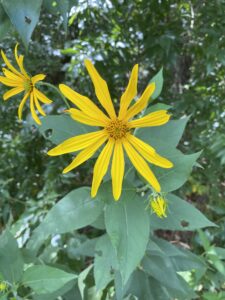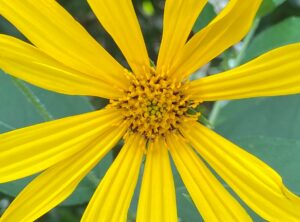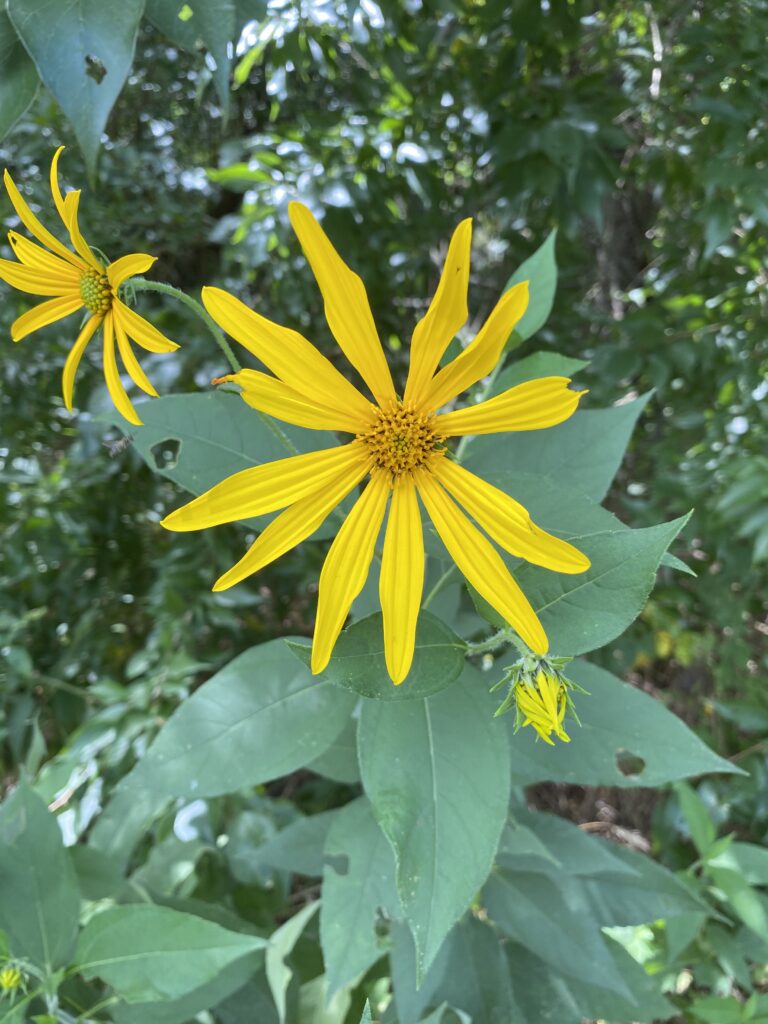In humility value others above yourself, not looking to your own interests but each of you to the interests of the others. Philippians 2:3-4

Ken and I were recently walking the lovely trail at the OTC Richwood Valley Campus and we enjoyed a number of fall wildflowers along the way but one particularly attracted our attention. Its bright yellow petals swayed in the breeze atop tall stems beckoning our phone cameras. I used my plant identifying feature and learned that it was likely a Jerusalem Artichoke (Helianthus tuberosus).
When we arrived back home and I’d had time to catch up on my household tasks, I deepened my research. I learned that the plant offers much more than just a pretty face. And it does have a very pretty face. Those bright yellow petals called ray florets form a ring that will range between 2 and 4 inches in diameter. But when I zoomed the photos, I found a myriad of tiny blooms that comprised the center of the flower. They can number as many as sixty per bloom and are called small disc florets. For a brief time, the flowers emit a light vanilla-chocolate perfume.
The more useful value is found only If we follow the tall lanky stems down to the ground and dig to discover the surprise that awaits beneath. When properly prepared the tubers from this plant offer an appealing nutty flavored side dish somewhat similar to an artichoke, hence the common name. The Jerusalem Artichoke has nourished humans for many centuries. They are known to have been a food staple for the indigenous people of North America and they are said to have been prepared by the native women in the Dakota territory for the members of the Lewis and Clark expedition.
From a modern perspective the tubers, which are the primary method of spreading the plants, are similar in raw texture to potatoes but scientists have discovered they have different properties that are not absorbed into the human digestive system and therefore do not allow a sugar build-up, making them a good substitute for potatoes in a diabetic diet. But back to our history lesson.
 Eventually, the Jerusalem Artichoke reached European nations by way of early explorers and colonists as they returned from the new world. It quickly acclimated to the climate there and became popular as a food crop while simultaneously all but disappearing from use in North America. In the last few decades, it has made a comeback and ingenious chefs are devising recipes and styles of cooking that make it attractive once again.
Eventually, the Jerusalem Artichoke reached European nations by way of early explorers and colonists as they returned from the new world. It quickly acclimated to the climate there and became popular as a food crop while simultaneously all but disappearing from use in North America. In the last few decades, it has made a comeback and ingenious chefs are devising recipes and styles of cooking that make it attractive once again.
…but let your adorning be the hidden person of the heart with the imperishable beauty of a gentle and quiet spirit, which in God’s sight is very precious. I Peter 3:4
I believe there may be a comparison between humans and the Jerusalem Artichoke. The plant has a lovely bloom that attracts attention, but the real substance of the plant is in its roots and you don’t realize that unless you “dig” a little deeper. Attractive people also draw attention and while there is certainly nothing wrong with being attractive, you may have heard your mother or grandmother say, “Beauty is only skin deep.” Until and unless we take the time to get to know a new person, we can’t be sure whether what we see on the outside is echoed by what the person thinks or the way they respond to others.
Man sees the outward appearance, but the Lord sees the heart. I Samuel 16:7
Another old saying goes, “All that glitters is not gold.” It’s very beneficial that we worry much less about our outward appearance to others and concentrate much more on how we treat them. Our true beauty generates from the heart. The heart of the Jerusalem Artichoke, its roots, provides life-giving nourishment. Can we say the same about our hearts? Do they provide life-inspiring spiritual nourishment to the people we meet? And can we apply the same principle to faith? Does it only reside on the surface for others to see or does it run deep?


